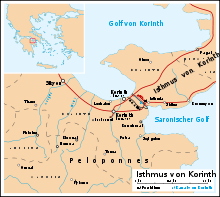Phlius

Phlius (/ˈflaɪəs/; Ancient Greek: Φλειοῦς, Phleious) was a Greek city in the northwestern Argolid (now in modern Corinthia, near Nemea), in the Peloponnese, said to be named after the Greek hero Phlias but formerly called Araethyrea (/ˌærəˈθɪriə/; Ἀραιθυρέα, Araithurea).[1]
Although geographically close to Argos, the city became a Spartan ally and a member of the Peloponnesian League.
Like many other cities of ancient Greece, Phlius fell into civil strife between a democratic and an oligarchic faction during the 4th century BCE; the democratic faction initially gained control and exiled its opponents, but in 380 BCE a Spartan army under Agesilaus laid siege to the city for some twenty months, eventually forcing the Phliasians to capitulate and accept oligarchic government.[2]
In 229 BC Phlius was ruled by the tyrant Cleonymus, when Aratus of Sicyon convinced him to step down and let his city join the democratic Achaean League.[3]
It was the hometown of the playwright Pratinas and of Plato's female student Axiothea of Phlius.
References
- ↑ Stephanus of Byzantium s. v. Phlious.
- ↑ Fine, p. 559.
- ↑ Polybius; Histories, II 44,6
Sources
- Fine, John V.A. The Ancient Greeks: A critical history (Harvard University Press, 1983) ISBN 0-674-03314-0
- Xenophon (1890s) [original 4th century BC].
 Hellenica. Trans. Henry Graham Dakyns. Wikisource.
Hellenica. Trans. Henry Graham Dakyns. Wikisource.
Coordinates: 37°50′44″N 22°38′47″E / 37.8455°N 22.6463°E